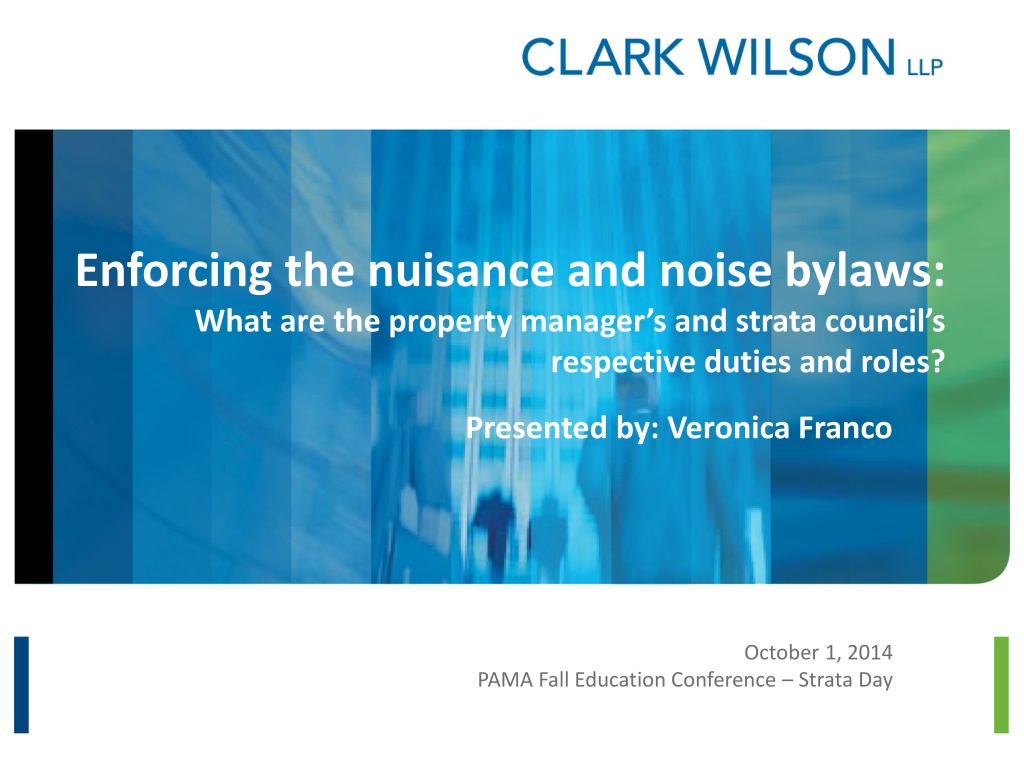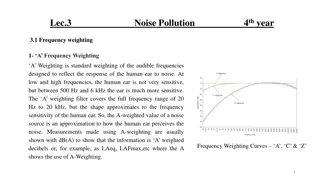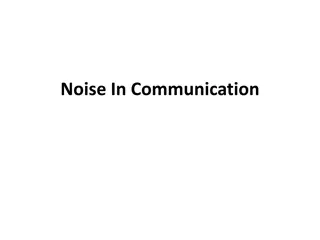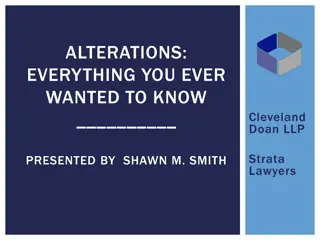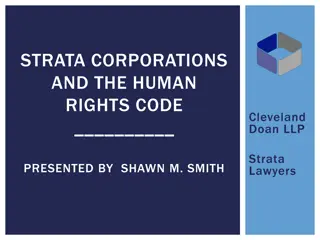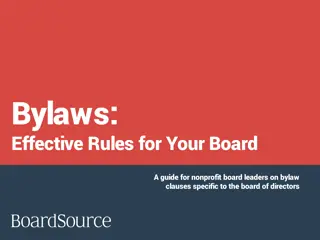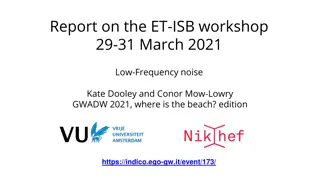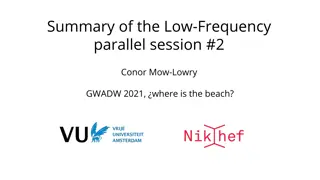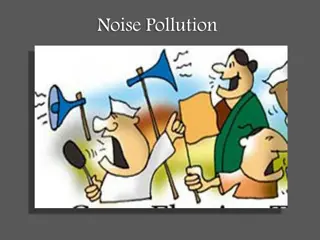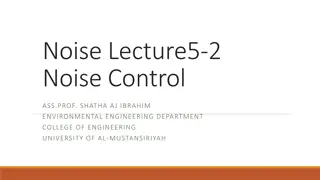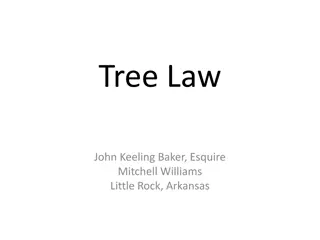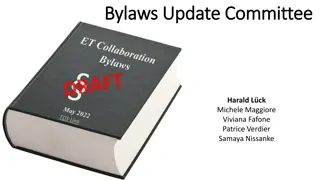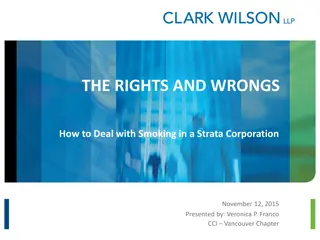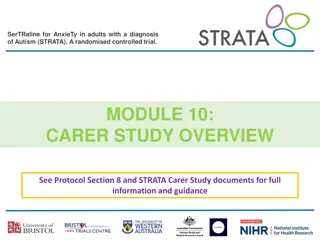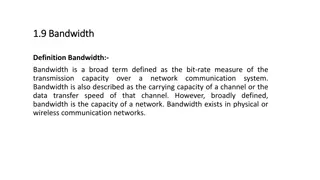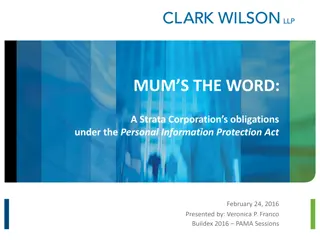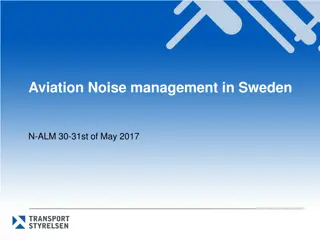Understanding Property Manager and Strata Council Duties in Enforcing Nuisance and Noise Bylaws
Exploring the roles and responsibilities of property managers and strata councils in enforcing nuisance and noise bylaws, this presentation delves into the challenges faced, pre-enforcement strategies, case studies, and information to provide to councils for effective resolution of disputes between owners. Learn about handling complaints, council responsibilities, enforcement tools, and more.
Download Presentation

Please find below an Image/Link to download the presentation.
The content on the website is provided AS IS for your information and personal use only. It may not be sold, licensed, or shared on other websites without obtaining consent from the author. Download presentation by click this link. If you encounter any issues during the download, it is possible that the publisher has removed the file from their server.
E N D
Presentation Transcript
Enforcing the nuisance and noise bylaws: What are the property manager s and strata council s respective duties and roles? Presented by: Veronica Franco October 1, 2014 PAMA Fall Education Conference Strata Day
Introduction Most difficult bylaws to enforce are: Use of property 3 (1) An owner, tenant, occupant or visitor must not use a strata lot, the common property or common assets in a way that (a) causes a nuisance or hazard to another person, (b) causes unreasonable noise, (c) unreasonably interferes with the rights of other persons to use and enjoy the common property, common assets or another strata lot,
INTRODUCTION Typical issue that comes to my office: Please provide some advice on how to handle this dispute between two owners. It has been going on for over 2 years. The downstairs neighbor complains of noise at all hours and all night. She is quite irate. The upstairs neighbor is aware of the complaints but has denied making any noise. The upstairs owner is feeling harassed. The council has levied some fines, but don`t know what else to do. Both owners have threatened to sue the strata. I have attached all of the correspondence on this matter.
INTRODUCTION By the time I have received this email, it is too late to deal with the underlying problem satisfactorily: parties are defensive, positional, and uncooperative.
OVERVIEW We will talk about how to handle these types of complaints : What Information to provide council ? Property manager`s role ? Council`s responsibilities ? Enforcement tools ?
Pre-Enforcement In most scenarios, the owner causing the noise is completely unaware of how their behavior is impacting neighbours. Therefore, it is often more fruitful to deal with a noise complaint without any punitive action.
Case Study Council receives the following complaint: My upstairs neighbor is driving me crazy. They are blaring music all day and all night everyday. I cannot live like this anymore. The council has to do something about this NOW.
Information to provide to council Let`s take a look at the Strata Property Act (the ``Act``) 26 Subject to this Act, the regulations and the bylaws, the council must exercise the powers and perform the duties of the strata corporation, including the enforcement of bylaws and rules.
Information to provide to council (contd) Control of council 27(2) The strata corporation may not direct or restrict the council under subsection (1) if the direction or restriction (b) interferes with the council's discretion to determine, based on the facts of a particular case, (i) whether a person has contravened a bylaw or rule, (ii) whether a person should be fined, and the amount of the fine, (iv) whether a person should be required under section 133 (2) to pay the reasonable costs of remedying a contravention of the bylaws or rules,
Information to provide to council (contd) 31 In exercising the powers and performing the duties of the strata corporation, each council member must (a) act honestly and in good faith with a view to the best interests of the strata corporation, and (b) exercise the care, diligence and skill of a reasonably prudent person in comparable circumstances.
Information to provide to council (contd) Standard bylaw 20 (1) Subject to subsections (2) to (4), the council may delegate some or all of its powers and duties to one or more council members or persons who are not members of the council, and may revoke the delegation. (4) The council may not delegate its powers to determine, based on the facts of a particular case, (a) whether a person has contravened a bylaw or rule, (b) whether a person should be fined, and the amount of the fine, or (c) whether a person should be denied access to a recreational facility.
Information to provide to council (cont`d) 135 (1) The strata corporation must not (a) impose a fine against a person, (b) require a person to pay the costs of remedying a contravention, or (c) deny a person the use of a recreational facility for a contravention of a bylaw or rule unless the strata corporation has (d) received a complaint about the contravention, (e) given the owner or tenant the particulars of the complaint, in writing, and a reasonable opportunity to answer the complaint, including a hearing if requested by the owner or tenant, and (f) if the person is a tenant, given notice of the complaint to the person's landlord and to the owner. (2) The strata corporation must, as soon as feasible, give notice in writing of a decision on a matter referred to in subsection (1) (a), (b) or (c) to the persons referred to in subsection (1) (e) and (f).
Information to provide to council (cont`d) Summary: Council has an obligation to enforce the bylaws. In doing so, they must act honestly and in good faith. The council serves a quasi-judicial role in that they have to determine whether a bylaw has been contravened and what punishment should apply. The council cannot delegate this power to anyone, including the property manager (standard bylaw 20) or the ownership (section 27(2) of the Act). Council must investigate the complaint.
Investigation Take another look at the complaint: Noise is taking place all day and all night everyday Does council have enough information to determine whether the above statement is true ? Is it likely true ? If the answer to either is true, go back to the complainant and explain that a noise complaint requires that an owner provide the following information: Date and time of the noise; Duration of the noise; Brief description of the noise; If it is a ongoing issue, maintain a log over the course of a week or two
Investigation (contd) Once the council receives better information, the council is in a better position to determine what further steps need to be taken to investigate. Possible options include: Sound level testing; Talking to the owner about this situation Attend the unit to hear the noise
Investigation (contd) Talking to the owner to discuss the noise Consider using a friendly tone without threat of fines or bylaw enforcement. The idea is to make them aware that there is a noise complaint and that council wants to work with the owner to determine whether the noise is coming from their unit and what steps can be taken to minimize the noise. Is this a building problem bad sound transmission? Is this a unit problem poor insulation used in hard surface flooring installation? Is this the resident`s problem resident using unit in unusual manner?
Investigation (contd) Depending on the answers to the above questions, more investigation may be necessary Is the noise really unreasonable or is it normal day to day noise Noise level apps - www.healthyhearing.com/content/articles/Hearing- loss/Protection/47805-The-best-phone-apps-to- measure-noise-levels Have a few council members attend to hear the noise In either situation, consider if it is worthwhile to have the owner making the noise participate.
Investigation (contd) Following the investigation, consider making recommendations to solve the problem: Conclude the noise level is not unreasonable since this is the decision of council, it will need to be reported in the minutes this ends the situation If the council decides the noise level is unreasonable enforce the bylaws
Enforce the Bylaws Enforcement options 129 (1) To enforce a bylaw or rule the strata corporation may do one or more of the following: (a) impose a fine under section 130; (b) remedy a contravention under section 133; (c) deny access to a recreational facility under section 134. (2) Before enforcing a bylaw or rule the strata corporation may give a person a warning or may give the person time to comply with the bylaw or rule.
Enforce the bylaws (contd) If the owner causing the noise was cooperative and appears receptive, consider giving a friendly warning with recommendations about minimizing noise: Limit certain activities to a certain times of day Install thick rugs or carpeting Install better insulation Consider enlisting the noisy owner in finding a solution.
Enforce the bylaws (contd) Why bother with just a warning: Remember the goal is to stop the problem behaviour.
Enforce the bylaws (contd) If the problem persists, it becomes time to use other enforcement tools Fines Remedying the bylaw contravention
Enforce the bylaws - Fines (contd) Section 135 must be followed before the fine can be levied: Complaint made to the council does not have to be in writing consider establishing policy that complaints are to be in writing
Enforce the bylaws - Fines (contd) Council must send a letter in writing that contains the particulars (details) of the complaint setting out the following: The bylaws being complained of; The amount of fines that can be levied Deadline to respond or provide a hearing Once deadline passes, at next council meeting, decide whether there has been a bylaw contravention and whether to fine the owner take into account any written response or information provided at the requested hearing Minute the decision in the minutes of the council meeting
Enforce the bylaws - Fines (contd) Collect the fines Small Claims Court This procedure will need to be done for each noise incident. You can do many complaints at once (i.e. the entire two week log). This accelerates the number of fines making it more economically feasible to pursue Small Claims Court Limitation period is 2 years time likely runs from the date the fine is levied (not the date of the behaviour) Civil Resolution Tribunal once it is up and running would allow for these types of claim to be adjudicated.
Enforce the bylaws - Fines (contd) The goal of fining: Deter further problem behaviour Sometimes to achieve the goal, the strata council will have to pursue legal action to collect the fines. What happens when the owner ignores the fine or simply pays it ?
Enforce the bylaws - Fines (contd) Fines are not truly bylaw enforcement Strata Plan LMS 4255 v. Newell, 2012 BCSC 1542, paragraph 78: Levying fines is a form of punishment; it is not an enforcement of a strata corporation s bylaws: see Willson v. Highlands Strata Corporation, 1999 CanLII 2900 (BC SC), 1999 CanLII 2900 (B.C.S.C.), at para. 28. There comes a point where a strata corporation must pursue injunctive relief.
Enforce the bylaws Remedying a contravention In the case of noise: Injunction to stop the noise activity or requires the owner, tenant or occupant to comply with the bylaw. Eviction as a last resort
Enforce the bylaws: Injunction Newell decision: FACTS: Mr. Newell owned a penthouse unit in a Yaletown condo complex with an LCP deck and balcony. He installed a free standing hot tub, bbq, and entertainment system with a large screen TV, and five speakers mounted at various places on the deck or balcony. Bylaws established a quiet period between 11 pm and 8 am. Mr. Newell frequently had `gatherings` resulting in one particular owner making numerous complaints. Mr. Newell simply paid the fines.
Enforce the bylaws: Injunction Newell: Mr. Newell s attitude seems to be that his closest neighbours Mr. Yu and Mr. Beilhartz are killjoys and do not belong in Yaletown. But Yaletown living does not give Mr. Newell an excuse for ignoring the Bylaws of his strata corporation. From the time he moved into Unit 3701 through to the filing of the Petition in May 2012, Mr. Newell s conduct and the manner in which he used and permitted others to use the outdoor space (the Deck and the Balcony) associated with Unit 3701 were disrespectful of his neighbours and in breach of the Bylaws. The conduct continued after the hearing of the Petition. Mr. Newell has displayed a poor grasp of one of the basic principles of condominium living even in Yaletown so aptly described by Mr. Justice Hall: that the proximity dictates that some forbearance and discretion is required of the occupants of such properties in order to avoid the infliction of misery upon fellow occupants. The Bylaws which bind Mr. Newell so long as he owns Unit 3701 exist to that end.
Enforce the Bylaw: Injunction Before you can proceed with an injunction: Need to attempt fining as a method of enforcement (Chorney v. Strata Plan VIS 770, 2011 BCSC 1811); and Three quarter vote resolution authorizing the law suit 31
Enforce the bylaws: Eviction Eviction: Effective Expensive Extreme cases 32
Enforce the bylaws: Eviction Jordison decision: Rose Jordison and her son were accused of significant bylaw violations resulting in fines of over $30,000. Most of the bylaw contraventions amounted to harassment of the owners. The Jordisons behaviour which concerns the Strata includes excessive noise, abusive language, uttering threats, and harassment. The violations included pounding on the floor, doors slamming, screaming and yelling in her unit, using foul language and gestures towards other residents in an effort to intimidate. In short, they were terrorizing the owners. 33
Enforce the bylaws: Eviction Result: Eviction is a two step process: 1. Court Injunction (just like Newell); 2. Application for eviction if the behaviour continues despite the Court Injunction. 34
Bylaw enforcement: Summary Ultimately, the enforcement of bylaws is one of council`s primary duties. It is not a passive endeavour. To do it well, it requires a council to be involved, investigate, and make recommendations. While fining is relatively easy to do, it leaves the onus on property managers to send a series of letters while not addressing the actual problem. Fining is a punishment, not enforcement. As a result, it is important for council to get to the root of the problem so that these behaviour type bylaw contraventions can be resolved before significant battle lines are drawn. 35
www.cwilson.com THANK YOU
